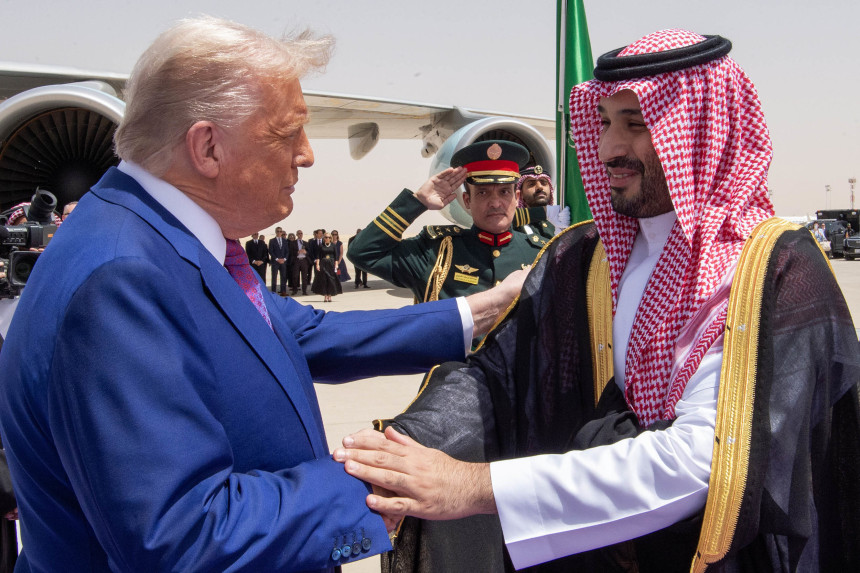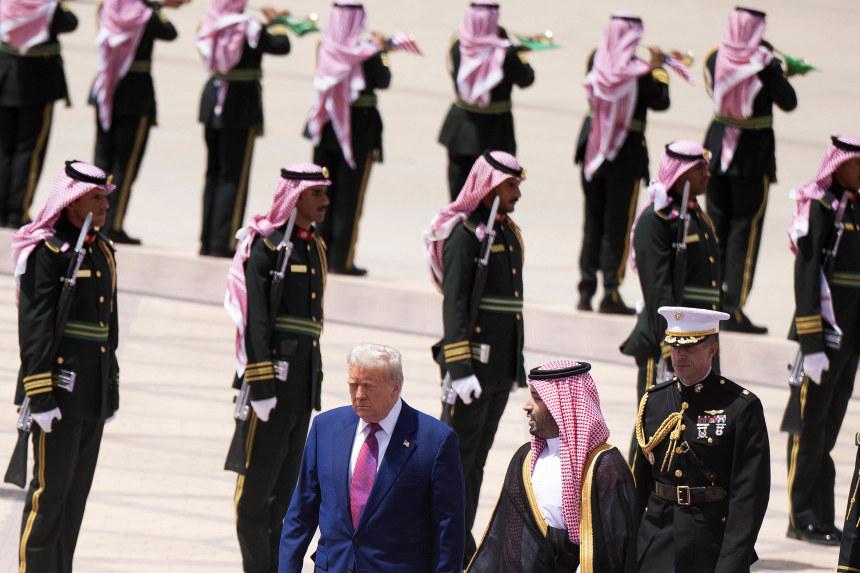The trip to Saudi Arabia, Qatar and the United Arab Emirates is focused on economic deals, but the wars in Gaza and Ukraine also loom.
President Trump is welcomed by Saudi Crown Prince Mohammed bin Salman on the tarmac in Riyadh on Tuesday.Bandar Al-Jaloud/Saudi Royal Court / Anadolu via Getty Images
In Qatar, Trump is expected to deliver a speech and speak with American troops at the Al Udeid Air Base, NBC News reported. Defense Secretary Pete Hegseth and Commerce Secretary Howard Lutnick were the two Cabinet secretaries accompanying Trump as he left Washington on Monday, along with senior White House staff.
Also on the agenda will be discussions with the Qatari government over the royal family’s gift of the plane. Worth about $400 million, it has been called a “flying palace,” sparking debate in Washington about whether the gift could run afoul of the emoluments clause of the Constitution, which forbids the acceptance of foreign gifts without congressional approval. In response, the White House said that the administration intends to abide by all ethics and transparency rules surrounding the gift.
Asked about his plan to accept the plane, Trump described it as a “contribution” that the U.S. can’t turn down: “I think it’s a great gesture from Qatar. I appreciate it very much. I would never be one to turn down that kind of an offer. I mean, I could be a stupid person and say, ‘No, we don’t want a free, very expensive airplane.’ But it was, I thought it was a great gesture.”
He said that the plane would go to his presidential library when he leaves office. “I wouldn’t be using it,” he added.
Conflicts loom over economic and financial deals
Before leaving Washington, Trump announced the return of an American hostage held by Hamas, Edan Alexander, and said he is hoping that Hamas releases more hostages on his Middle East trip.
And the trip comes with serious diplomatic opportunities, said Miller, the Carnegie fellow, highlighting the potential for Trump to address major regional issues, setting his approach apart from predecessors.
“There are issues in play which did not exist in [Trump’s first term], which offer the president actually quite remarkable opportunities neither Obama nor Biden took on the Israeli-Palestinian issue and Iran,” added Miller, a veteran diplomat who has advised Republican and Democratic administrations on the Middle East.
Trump with Bin Salman upon his arrival in Riyadh on Tuesday.Brendan Smialowski / AFP via Getty Images
But the war in Gaza threatens to derail hopes of expanding Trump’s signature Abraham Accords, which he has touted as the crowning foreign policy achievement of his first term. The accords, which normalized relations between Israel and several Arab states, were a cornerstone of Trump’s Middle East policy.
President Joe Biden sought to build on that legacy by brokering a normalization deal between Saudi Arabia and Israel, but he was unable to do so. Amid the fighting between Israel and Hamas in Gaza, prospects for a Saudi-Israeli agreement appear increasingly remote.
Since Trump’s return to office, Saudi Arabia has reaffirmed its support for a Palestinian state and cited this as a condition for establishing diplomatic ties with Israel. Trump’s itinerary this week does not include a stop in Israel, a departure from his first regional visit during his previous term, which also saw him go to Saudi Arabia.
“He wants to be seen as this global peacemaker,” said a former senior administration official, speaking on the condition of anonymity to discuss internal deliberations. The official noted that Trump also faces frustration with the war in Ukraine, where his calls for peace have yet to yield results despite his lofty initial pledges to put the war to an end quickly upon taking office.
Trump said he would consider flying to Turkey for a potential meeting Thursday between Ukrainian President Volodymyr Zelenskyy and Russian President Vladimir Putin.
“I was thinking about actually flying over there,” Trump said on Monday, adding that he would go “if I thought it would be helpful.”
Source: Katherine Doyle
Katherine Doyle is a White House reporter for NBC News.




Social Plugin